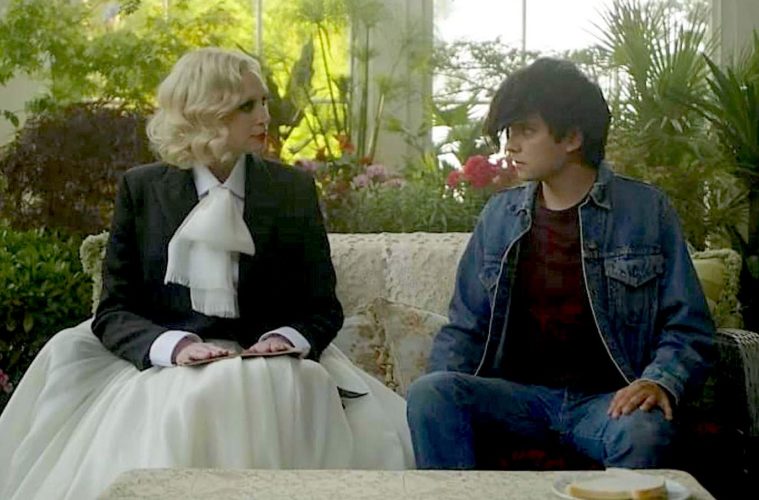 Peter Strickland’s new film, Flux Gourmet, revels in savory, deadpan freakitude, but I’m going to have a hard time telling you what it is. It’s not any kind of horror film, despite some of the advertising (a vote of sympathy goes out to the marketing team); it seems to be a satire, but of what? It’s not quite like Strickland’s other genre corkscrews—Berberian Sound Studio, The Duke of Burgundy, In Fabric—all of which, though just as fraught with obsessiveness, have at least one tendril dipped into some kind of reality, though primarily a reality filtered through old genre movies.
Peter Strickland’s new film, Flux Gourmet, revels in savory, deadpan freakitude, but I’m going to have a hard time telling you what it is. It’s not any kind of horror film, despite some of the advertising (a vote of sympathy goes out to the marketing team); it seems to be a satire, but of what? It’s not quite like Strickland’s other genre corkscrews—Berberian Sound Studio, The Duke of Burgundy, In Fabric—all of which, though just as fraught with obsessiveness, have at least one tendril dipped into some kind of reality, though primarily a reality filtered through old genre movies.
Flux Gourmet is its own oddball universe, and that universe is confined to a single location: the Sonic Catering Institute, an old manor house in the country that hosts residencies for artist collectives whose auditory performances are derived from the sounds of cooking. Despite what it sounds like, this isn’t a whimsical notion Strickland just dreamed up: Since 1996, he’s been a founding member of the Sonic Catering Band, whose website lists dozens of released recordings (many sold out), each including the recipe of the food being prepared. So, he can’t be lampooning art world silliness with the same kind of perf art he’s been making himself for decades. Can he? Go ahead, listen to some tracks and watch the film, and you tell me.
Currently in residence at the Institute is a laconic three-person collective led by frontwoman Elle di Elle (LDL, get it?), played by Strickland favorite Fatma Mohamed, whose naked performances can involve tomato sauce and are always followed by a vaguely defined and hazily shot “audience tribute”—orgies plus food? The other members (Ariane Labed, Asa Butterfield) handle the audio technology and onstage cooking, when they’re not smoking, sketching tech diagrams, and bristling at Elle’s diva schtick. To one side of them is the Institute’s imposing, overdressed director/owner Jan Stevens (Gwendoline Christie), who wants to have input on the art pieces, and to the other is the movie’s narrator, Stones (Makis Papadimitriou), a portly Greek journalist documenting the residency—and battling a case of catastrophic flatulence.
You begin to suspect that Stones’s humiliating gastrointestinal crisis—which includes getting on stage for a public colonoscopy—will build to some kind of explosive art-food-shit denouement, the way similarly obsessed Peter Greenaway movies used to. But Strickland’s movie prefers droll weirdness to progression; it has the rhythm of a ritual, or an elaborate game with semi-secret rules. Stones’s lengthy interviews with the artists in residence are interpolated with miming exercises; every morning, the three go on silent “thinking walks,” Stones in tow. (He narrates, in Greek.) Strands of drama—including the occasional art-terrorist assault by a rival food-art collective who didn’t win the residency, and who like to kill turtles—dangle and tease, often repetitively, sometimes hitting the Overly Long Gag sweet spot, sometimes sailing far past it. Eventually, both coprophagia and cannibalism are incorporated into the artistic process, but the lingering issue for all concerned becomes whether or not the actions were genuine or faked.
The ghost of Greenaway nags at the movie—particularly A Zed & Two Noughts (1985), The Belly of an Architect (1987), and The Cook, the Thief, His Wife & Her Lover (1989)—because Greenaway engaged with the ambiguous muck of food, digestion, rot, and excrement with a deranged zeal that Strickland lacks. Oddly, Flux Gourmet feels tasteful and restrained, once you acclimate to its outre set of ideas.
The relationship between food and sound is, ultimately, underexplored, with the film’s emphasis instead falling on the eccentric pan-European cast, who waste no opportunity to vogue up and snack on their ripely ironic dialogue. In particular, as the Institute’s menacingly abstruse physician, the cadaverous Richard Bremmer rolls every line like it’s a dollop of caviar. Best of all, though, is the Romanian-born Mohamed, who is some kind of miraculous oddity, a secretive prima donna with a witch-queen gaze and a voice like cracking ice. She’s been in every one of Strickland’s features (and very little else), and her Elle di Elle is the new film’s main attraction—puzzling, like the film, but tirelessly fascinating.
Editor’s note: The disclaimer below refers to advertising posts and does not apply to this or any other editorial stories. LA Weekly editorial does not and will not sell content.
Advertising disclosure: We may receive compensation for some of the links in our stories. Thank you for supporting LA Weekly and our advertisers.

